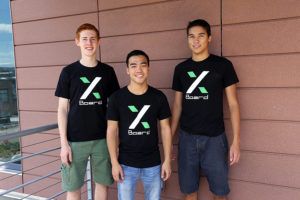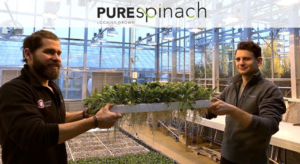By Meghana Reddy | MBA ’17 Candidate, Cornell University; Forte Fellow, Emerging Markets Institute Fellow
Cornell University’s eLab accelerator program for student startups has helped hundreds of students turn their concepts into thriving businesses. But what does it mean to balance the life of a graduate or undergraduate student with the round-the-clock demands of entrepreneurship? Hear from three companies – Xboard, Echiuma, and PureSpinach — as they prepare to pitch at eLab’s public Demo Day during Entrepreneurship Celebration on April 27th, and the New York State Business Plan Competition in Albany on April 28th.

XBoard Team: Eric Berg, CTO; Jeffrey Ly, CEO; Aaron Wisner, CED
XBoard is an energetic company on a mission to infuse extreme sports with the power of cutting-edge technologies. The team of grads and undergrads has developed a prototype for their first product, Zero. Zero is a skateboard with a 2KW electric boost for faster acceleration. Unlike many motorized skateboards, the Zero is “trickable,” making it appealing to athletes who want to rev up their stunts.
XBoard had opportunities to pitch live at the Forbes “30 Under 30” Summit, work with Blackstone Launchpad, and develop prototypes with A123 Systems Boston HQ. They traveled widely to conduct customer discovery, getting valuable feedback during demos at the XGames 2016 in Austin, TX and CES 2017.
“I think the most valuable thing about being a student entrepreneur at Cornell is having the close and unwavering support of the incredible mentoring network,” says CEO Jeffrey Ly, who is also a graduate student in Engineering. “Early on, we’re bound to make mistakes. Having the support of our mentors has helped us avoid mistakes and, where we aren’t able to avoid them, they’ve helped us rebound quickly.”
XBoard is preparing to pitch in front of over 100 C-level executives from companies like Under Armour, New Balance and Reebok later this month. Their trick to balancing a packed schedule? Sometimes, they admit, they lose a little sleep.

Echiuma Team: Jessica Ogonor, Founder & CEO; Briana Ford, CFO; Gina Banks, COO
Echiuma is a renewable energy startup, designing and installing high-quality, off-grid solar systems to provide a consistent source of electricity to businesses in Nigeria. The systems are more affordable, efficient, and sustainable than the main solution currently in place: diesel generators.
Founder Jessica Ogonor has experience in Nigeria’s solar industry, and is a dual US/Nigerian citizen. She chose an MBA program at Cornell specifically to work on her startup, and found herself immediately connected to a network of innovators.
“There is an opportunity for us to connect to people we wouldn’t have access to in another environment like professors and alumni – but also professionals,” she says. “[Creating a startup is] a good opportunity for those who will work in established companies after… you might not have that chance in the regular workplace. [It is a] more well-rounded experience than just book learning.”
Echiuma has attended has attended several conferences recently, to gain insight into local market conditions, implementation approaches and local sourcing of materials. They plan to ramp up their travel for customer discovery and have a process for keeping their team organized. They share a calendar and keep the lines of communication open; knowing what team members are working on in class and in their daily lives keeps things running smoothly.

PureSpinach Team: Ziad Jarjouhi, Cofounder; Serdar Mizrakci, Cofounder
PureSpinach has a simple goal: sells tasty, nutritious, hydroponic spinach that is locally-grown, no matter the season. The hydroponic spinach is pesticide-free and can go farm-to-table in less than 24 hours. These delicious leaves are currently available in only three Ithaca grocery stores, but PureSpinach has ambitious plans to expand their footprint quickly.
According to co-founder and SC Johnson Graduate School of Management student Ziad Jarjouhi, the life of a student is compatible with that of an entrepreneur. “The best time to launch a startup is while going to school, when we are surrounded by an abundance of resources,” he says. “The [mentors] are all experts in their fields. Having the opportunity to consult them… is truly priceless.”
PureSpinach was the winner of the Cornell Entrepreneurship Summit pitch competition in November 2016 and Grand Prize Winner at the 2017 Mai Bangkok Business Challenge, an international startup competition where business school teams from around the globe pitch their innovative, new ventures.
Is all that traveling hard? “We always joked that if we [need] 30 hour days instead of 24 in order to fulfill our duties to both the MBA program and our startup,” admits Jarjouhi. “[But] the eLab program was very useful in helping us structure our schedules to meet our deadlines. We [segregate] our schedules, dedicating time to work on school and on the startup.”